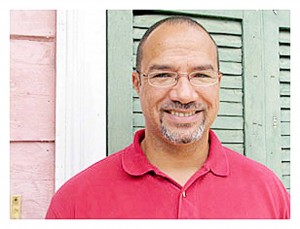History Makers’ archives inclusive of New Orleanians
14th July 2014 · 0 Comments
By Susan Buchanan
Contributing Writer
The lives of more than 40 African Americans born in New Orleans, along with memories of their ancestors, have been recorded by The HistoryMakers, a Chicago nonprofit. In late June, the Library of Congress said it will house those interviews, which form the nation’s biggest collection of Black oral histories. So far, 2,600 people across the country have been interviewed as part of a project that began in 1999.
Vance Vaucresson, third-generation owner of Vaucresson’s Sausage Co. in the Seventh Ward, discussed his lineage with a HistoryMakers’ crew that interviewed him in June 2010. Vaucresson’s mother, a librarian, helped integrate the New Orleans Public Library in the 1960s, while his restauranteur dad was the only Black business owner on Bourbon St.
Vaucresson, a father of school-age kids, said last week he hopes all Black Americans, including young people, will access these oral histories and biographies. “Our schools are focused on math and science scores and don’t teach much history these days,” he said last week. “Kids are forward-looking but it’s important for them to know where they came from and what their ancestors accomplished.” He was born here in 1968, seven decades after his family’s meat business started in 1899.
The videotaped HistoryMakers’ interviews run from three to six hours each, and focus on the culture, achievements and struggles of African Americans. The New Orleans natives interviewed so far were born in the last century, and while some of them stayed here, more than half moved away—particularly to Chicago, Los Angeles and other parts of California, Atlanta, New York City and Washington, D.C.
The city’s native HistoryMakers who have stayed—for at least most of their lives—include music producer Harold Battiste Jr.; jazz pianist Ellis Marsalis; Liberty Bank & Trust president and CEO Alden McDonald Jr.; R&B musician and bandleader John “Deacon” Moore; retired Louisiana Supreme Court Justice Revius Oliver Ortique, who died in 2008; poet and magazine editor Kalamu ya Salaam; attorney and former Orleans Parish Civil Sheriff Paul R. Valteau Jr.; and jazz musician and Xavier University professor Michael White.
HistoryMakers who brought their talents here from other parts of the state include restaurant owner and chef Leah “Dookie” Chase, who grew up in Madisonsville in St. Tammany. Two-time Grammy winner Irma Thomas was born in Pontchatoula in Tangipahoa Parish, but raised here. Federal judge Ivan Lemelle moved to the Crescent City from St. Landry Parish. Norman Francis headed here from Lafayette and has been president of Xavier University since 1968.
Out-of-state HistoryMakers who migrated here include music educator and author Freddi Evans from Mississippi, along with civic leader and Dryades Savings Bank co-founder Charles Teamer from North Carolina.
One of the native New Orleans HistoryMakers living elsewhere is civil rights leader and politician Andrew Young, who was born here in 1932 and resides in Georgia. Former New Orleans Mayor Marc H. Morial, born in 1958, has been president of the National Urban League in New York City since 2003.
Vaucresson said he’s honored to have been included with these luminaries. In his videotaped interview, he tried to clear up misconceptions about Creoles, a term that he said fell out of favor in the Black community. Creoles are viewed as a group that had more rights and assets than Americans from Africa, he said. His ancestors are from Alsace-Lorraine, France, but they encountered racism here.
Terms for Black Americans as a group keep evolving, Vaucresson noted. While “colored people” is considered offensive and no longer used, ”people of color” casts a wider net to include many nationalities, he said. He also said the port city of New Orleans—an immigrant melt from Europe, Africa, the Caribbean and Canada—is a harbinger of what demographers expect the United States to look like by 2025.
As for the significance of the HistoryMakers, “it’s the largest archival project of its kind since the Works Progress Administration documented the experiences of former slaves in the 1930s,” HistoryMakers’ founder and executive director Julieanna Richardson said in Chicago.
After the Civil War ended in 1865, a constitutional amendment freed U.S. slaves. Before that, the number of American slaves had reached four million. The Library of Congress houses a compilation called “Voices from the Days of Slavery,” which predates the The HistoryMakers collection. The 23 audio-recorded slavery interviews, conducted from 1932 to 1975, were with Southern Blacks born from 1823 to the early 1860s.
In the more recent HistoryMakers compilation, many of those interviewed told stories about ancestors who were slaves, Amrita Balachandran, HistoryMakers researcher and writer said last week.
To reach their goal of 5,000 people, HistoryMakers archivists are asking for recommendations about additional African Americans to interview. To access The HistoryMakers’ biographies and videos and to offer suggestions, visit the web at www.thehistorymakers.com.
Separately, to hear narratives of former Southern slaves, contained in Library of Congress archives, visit http://memory.loc.gov/ammem/collections/voices/.
This article originally published in the July 14, 2014 print edition of The Louisiana Weekly newspaper.




